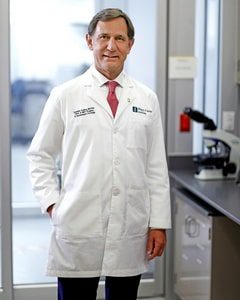|
Getting your Trinity Audio player ready...
|

Exciting advances in immunotherapy, the discovery of novel agents and a better understanding of the molecular makeup of an individual’s disease are leading to revolutionary changes in the treatment of patients with hematologic cancers.
The news on the latest promising treatments impacting life expectancy and quality of life came out of Miami Cancer Institute’s Summit of the Americas on Immunotherapies for Hematologic Malignancies, the second annual gathering of the top experts in the field.
Nearly 300 physicians and other healthcare providers attended the recent Summit.
In the United States in 2020, nearly 180,000 people were diagnosed with a form of blood cancer, according to the Leukemia & Lymphoma Society. As clinical trials and research continue, physician scientists are gaining more insight into which patients respond better to immunotherapy versus chemotherapy or who might need a combination of the treatments along with stem cell transplantation, said Guenther Koehne, MD, PhD, course director and deputy director and chief of Blood & Marrow Transplant and Hematologic Oncology at Miami Cancer Institute.
“There has been an explosion in research that has led to a rapidly evolving environment in the treatment of cancers such as leukemia, lymphoma and multiple myeloma,” Dr. Koehne said. “The Summit faculty are physicians who are overseeing many of these treatment breakthroughs. By sharing information in this format, we can move these developments to the patient bedside more quickly.”
Among those in the renowned group was Robert Sackstein, MD, PhD, of the Herbert Wertheim College of Medicine at Florida International University, whose laboratories are working on the more directed maneuvering of genetically altered cells that battle cancer, accelerating their movement to the sites they are most needed, thereby allowing physicians to administer lower doses of drugs and reduce toxicities.
Dr. Koehne is a pioneer in allogeneic stem cell transplantation and immunotherapies, having developed a technique to manipulate donor cells to treat those with acute myeloid and lymphoblastic leukemia and multiple myeloma. The manipulation of donor stem cell products prior to allogeneic stem cell transplantation diminishes the often-harmful graft versus host disease complication of transplantation.
“I think one of the most exciting things about the work that all of us who took part in the Summit of the Americas do is that we are showing that treatments are becoming more sophisticated and more targeted to the individual,” Dr. Koehne said. “This is not one size fits all care. Every day we are learning new facts about how to choose and integrate the best medications and treatments for the specific individual. And we are finding new treatments for those with extremely complicated cases. This improves outcome and gives us hope.”
While this year’s Summit of the Americas on Immunotherapies for Hematologic Malignancies was conducted virtually due to the COVID-19 pandemic, next year’s should return in person in Miami.
Miami Cancer Institute is part of Baptist Health South Florida, the largest healthcare organization in the region, with 11 hospitals, more than 23,000 employees, 4,000 physicians and 100 outpatient centers, urgent care facilities and physician practices spanning across Miami-Dade, Monroe, Broward and Palm Beach counties.





